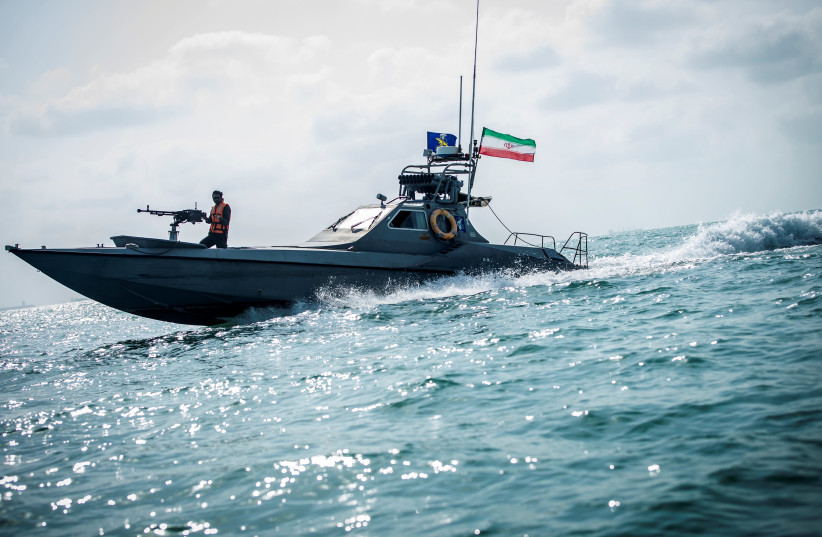As the United States and Western countries continue to push for a deal with Iran regarding its nuclear program, Israel is watching with great concern as Washington considers removing Iran’s Revolutionary Guard Corps (IRGC) from the terror blacklist.
The possible move by the administration of President Joe Biden would be in return for a public commitment from Iran to de-escalate in the region. A commitment that Israeli officials do not believe would be kept.
Israel has been carrying out its war-between-wars campaign for close to a decade in an attempt to prevent Iran from entrenching itself in Syria and to stop Tehran from smuggling advanced weaponry to its proxy in Lebanon, Hezbollah.
The IRGC and its Quds Force were the main targets of Israel’s campaign, known in Hebrew as MABAM. Over the years it has carried out thousands of kinetic strikes, in Syria and further from its borders, by land, sea, air as well as cyberkineticly in order to prevent the Iranian regime from reaching its goal of regional hegemony as well as becoming a nuclear state.
While Iran’s conventional military is far from capable of going up against the IDF or American forces in the region, the IRGC-one of eight military branches- the IRGC and its Quds Force is not only the Islamic Republic’s most feared and advanced military branch, it's also a powerful political and economic player and answer directly to Ayatollah Ali Khamenei.

The IRGC and its Quds Force have been for years involved in countless attacks targeting Israelis and Jews around the world including the deadly 1994 AMIA bombing that killed 85 people and injured hundreds more.
It has also been striking targets across the Middle East with its arsenal of combat drones, killing civilians and destroying strategic infrastructure, like Saudi Arabia’s ARAMCO oil refinery in a 2019 attack.
The IRGC and its Quds Force as well as local militias such as Kataib Hezbollah and the Popular Mobilization Units have also carried out attacks using drones as well as missiles against US forces in the region, targeting Americans based in both Syria and Iraq.
Hezbollah, Iran’s proxy, was said to have 200 Iranian-made UAVs in 2013 and with the help from the Islamic Republic, it has since significantly increased its fleet that is set to be used for kamikaze attacks on strategic national assets in Israel as well as reconnaissance against IDF troops and bases.
According to a February report by the ALMA Research Center, Iran has over 20 production, storage, and launch sites bases used by Iran to launch drones in Iran, Iraq, Syria, and Lebanon.
Iranian drones, the majority of which are under the command of the IRGC, have also been smuggled to the Houthis in Yemen as well as to terror groups in the blockaded Gaza Strip and even to Venezuela.
Iran’s drone army was built to counter Israel’s air superiority and in recent weeks, Israel’s MABAM has specifically targeted these drones hitting the Kermanshah airbase in a strike carried out by six drones. The strike destroyed hundreds of drones and led to Iran firing 12 ballistic missiles towards Erbil in Iraq’s Kurdistan region targeting what they claimed to be an Israeli military base.
While Israel has been less vocal in its opposition to a nuclear deal, it is clear that Jerusalem is understanding that it needs to switch tactics and has begun publicly voicing its concerns.
On Monday Prime Minister Naftali Bennett said it was “delusional” to delist the IRGC and Defense Minister Benny Gantz said that Israel “will keep our destiny in our hands and not in the hands of the fate of the world.”
The following day, former Chief of Staff and Defense Minister Boogie Yaalon warned that Israel will continue to act against Iranian threats.
“The Iranian regime is the main perpetrator of terrorism in the Middle East and we can see its impact throughout the region: in Syria, Yemen and Hezbollah’s Lebanon which has about 170,000 missiles aimed at Israel,” he said.
Speaking at the ISDEF conference in Tel Aviv, Yaalon said that Iran’s regional aggression “has to do with its aspirations. It’s a combination of religion and aspiration. It is not only towards Israel but they are working actively to wipe Israel off the map.”
“In the end, our goal is to make sure that Iran does not have nuclear weapons. If the sanctions do not work. We will act to protect our lives,” he stressed.
It was under Yaalon term as Defense Minister that the IDF’s war-between-wars campaign began in Syria. Ten years later, while Iran has still not been fully kicked out of Syria, Israel’s defense establishment maintains that Iranian forces and proxy militias have significantly reduced their presence in the country.
Nevertheless, Iran’s ongoing regional hostility continues unbounded. And should Washington delist them, as they did with the Houthis two months ago, it is on Washington’s conscious should more blood be shed.
Iran is a master in patience and has time on its side, especially while its politicians are maintaining a diplomatic front in Vienna with the West in order to sign a deal that would see the release of millions of dollars worth of sanctions.
Israel, meanwhile, does not believe that time is on its side and will not leave its fate in the hands of Western diplomats. As such, it has been working to increase its military capabilities and prepare plans for when the day comes and the order is given.
